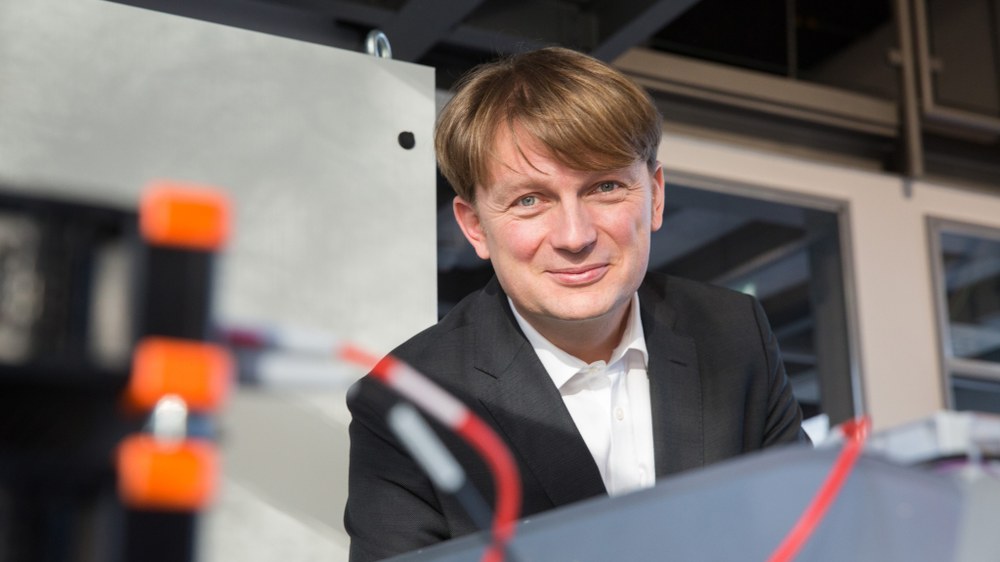Carsten Agert at the panel discussion for the "Hydrogen Dialogue" conference

- The public "Hydrogen Dialogue" is a three-day conference that will begin on Monday, 10 October 2022 in Berlin with strong DLR involvement.
- In terms of content, it will focus on the complex challenges in the course of the hydrogen innovation process that has been initiated. These will be identified and possible solutions discussed.
- Institute Director Pro. Dr Carsten Agert will take part in the panel discussion "Germany's hydrogen economy - insights into political and industrial challenges".
- Focus: Energy, hydrogen, knowledge transfer
The public "Hydrogen Dialogue" will begin in Berlin on Monday, 10 October 2022, with strong participation from the German Aerospace Center (DLR). The three-day conference is intended to help identify the complex challenges in the course of the hydrogen innovation process that has been initiated and to discuss possible solutions. The event is being organised by the "Hydrogen Compass" research project, which aims to draw up a roadmap for a German hydrogen economy, as well as the "Hydrogen Research Network", which acts as a driving force for funding strategies along the entire H2 value chain as part of the National Hydrogen Strategy. Over 350 experts from politics, industry, business, universities, research and civil society are expected to attend.
"This broad-based format of the hydrogen dialogue enables us to tailor our research content precisely to economic, ecological and political requirements," says Prof. Dr Carsten Agert, Director of the Institute of Networked Energy Systems. Since March 2021, he has also been co-spokesperson for the "Infrastructures and System Integration" cluster, one of four thematic clusters in the "Hydrogen Research Network". Agert points out that hydrogen research remains indispensable for the success of the energy transition: "For the economic ramp-up of hydrogen technologies, numerous research questions still need to be clarified during the process. It must also be ensured that the transition is continuously accompanied and optimised by system-analytical research."
The complexity of the coordination required to shape a future hydrogen economy is illustrated by the wide range of topics covered in the "Hydrogen Dialogue" workshops: aspects of international energy carrier logistics will be discussed, as will the necessary H2 infrastructures, standardisation standards, business models, the need for skilled workers, sustainability criteria and possible H2 production processes beyond electrolysis. On the second day of the conference, starting at 9 a.m., Agert will head the session "Systemic sector coupling of transport/hydrogen" to discuss which interfaces between the mobility sector and the energy system could be utilised. Over 70 participants have registered for this programme item alone. One focus will be on the emerging parallel existence of synthetic fuels, battery-electric concepts and hydrogen drives in the mobility sector. Agert will also be taking part in the panel discussion "Germany's hydrogen economy - insights into political and industrial challenges" from 2 pm. This will be introduced by keynote speakers from the Federal Ministry of Economics and Climate Protection and the Federal Ministry of Education and Research.
In addition to Agert, the Institute of Networked Energy Systems is actively involved in the conference programme with other researchers. Together with Dr Carsten Hoyer-Klick and Dr Hendrik Langnickel (as well as Dr Geert Tjarks from EWE Gasspeicher GmbH), he is responsible for preparing and organising the cluster session "Infrastructures and System Integration" at the start of the conference. More than 110 participants have registered for this session alone. Hoyer-Klick will also be speaking on suitable fuels for certain transport segments in the above-mentioned session "Systemic sector coupling of transport/hydrogen" and has been invited as a panellist. Dr Alexander Dyck will also be a panellist in the session Systemic sector coupling electricity/hydrogen (10.10.2022, 5 p.m.). DLR will also be represented by Dr Juliane Prause from the Institute of Combustion Technology. She will lead the session "Hydrogen-based downstream products for chemistry and transport" and is responsible as co-spokesperson for the cluster session "Production of hydrogen and downstream products".
More information:
